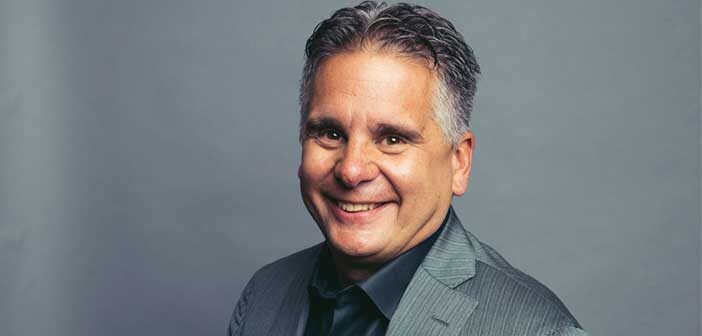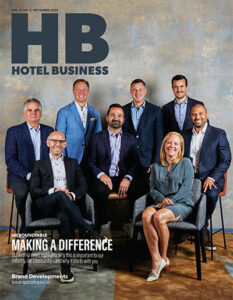As the world is coming out of the COVID-19 pandemic, hotel brands are strengthening their positions and exploring new categories. Hotel Business caught up with Carlton Ervin, global development officer, international, Marriott International; Chip Ohlsson, chief development officer, North America, Wyndham Hotels & Resorts; David Pepper, chief development officer, Choice Hotels; Julienne Smith, chief development officer, Americas, IHG Hotels & Resorts; and Noah Silverman, global development officer, US & Canada, Marriott International, to get their thoughts on where the brands stand.
—Gregg Wallis
One of the things that was expected with the pandemic was that brands would be even more important to guests than ever before, given things like cleaning protocols and safety issues. Did you find that to be the case?
Ohlsson: Absolutely. While the value of a good brand has never diminished, for many, the pandemic was a reminder of just how important they are, both for guests as well as hotel owners. If you were traveling at that time, you wanted to stay with a brand that you knew and whose efforts around health and safety you could trust. On the flip side, if you were an owner, you wanted to be affiliated with a brand so that it could not only help you capture those guests, but also navigate the uncharted waters of the pandemic. For those reasons, it wasn’t just about being affiliated with a brand, but rather being affiliated with the right brand. And that’s still the case today. Brands have never mattered more.
Pepper: Expectations on cleanliness and staff service are shifting in this post-pandemic world. Customers are smarter and more informed than ever before. They’re active on social media and are constantly posting and checking out online reviews. They’re quick to point out when hotels fall short, as well as when hotels go above and beyond to provide an outstanding experience. Building and protecting your hotel’s reputation has always been paramount, but in an increasingly competitive environment and digitized world, it’s even more important because, put simply, guests expect more. Since guests’ expectations are higher, protocols have been incredibly important to our guests as a result of the pandemic, and our Commitment to Clean initiative helped build trust in all our brands.
Smith: While IHG always has prioritized the delivery of clean and safe environments for our guests and staff, the pandemic provided an opportunity to reevaluate our approach and give greater confidence to everyone who enters our hotels. Guests have even higher standards now and are holding the brands they’ve long trusted more accountable. Knowing this, we made sure that cleanliness and hygiene are key pillars of our overall efforts to provide a richer and more fulfilling experience for our loyal travelers.
Following the onset of the pandemic in 2020, we partnered with leading health and sanitation organizations—including the Cleveland Clinic, Ecolab and Diversey—to launch our Clean Promise platform and set the tone for the inevitable return of guests and business. Clean Promise expands our deep cleaning and disinfection protocols across our reception areas, public spaces, guestrooms and food and beverage stations, and we continue to identify new ways to minimize contact among high-touch items. Additionally, we’ve established a Global Cleanliness Board to continuously reevaluate and recommend changes to our solutions, practices and processes.
How would you characterize the hotel franchising model moving forward? What changes might you make based on some of the lessons you learned during the pandemic?
Ohlsson: The franchising model is strong, particularly for organizations like Wyndham, where our focus is on listening to the needs of our owners and developers. We’re an owner-first organization, meaning we put our franchisees at the center of everything that we do. What the pandemic reinforced for us is the importance of that approach and the importance of us continuing to invest in the relationships that we have with our franchisees. It’s one of the things that differentiates Wyndham from other companies. Those relationships start on day one when we first have a conversation with a developer about a new hotel or conversion. Our job is to listen to their vision, understand their market and then work to pair them with the right brand so they can be successful in the long term.
Pepper: We’re continuing to prioritize the success of our franchisees by developing new tools, programs and resources to position our seasoned and emerging franchisees for success. We are also working on new design concepts aimed at capitalizing on the emerging trends and growth opportunities within each segment.
Choice is continuing to make enhancements to its revenue management resources to further optimize rate growth for the remainder of 2022 and beyond. With enhanced distribution capabilities, Choice has driven growth as compared to 2021 and 2019 through increased revenue contribution in Q2 of 2022 from choicehotels.com. Business delivery through this channel significantly improves owners’ profitability by bringing more guests into their hotels at the lowest cost. Choice’s tools, capabilities and expert advice from revenue management consultants enable franchise owners to quickly execute the right pricing strategy and effectively reach their target customers, which is critical in this inflationary environment. We were the first hotel company to return to—and exceed—2019 performance levels, and ChoiceMAX was a huge part of that success.
Choice Hotels is committed to improving owners’ bottom line, and when franchisees told us they wanted more support lowering operational costs, we listened. Housekeeping Upon Request can save a hotel tens of thousands of dollars in labor alone with no effect on guest satisfaction—when implemented correctly. Managing labor expenses and staffing ratios is critical in a tight labor market, and the Housekeeping Upon Request program saves owners time and money.
Smith: The pandemic reinforced the importance of strategic relationships in overcoming adversity and, as a result, the franchising model is even stronger today than it was before 2020.
It was amazing to see brands, owners and leaders from across all aspects of the hospitality industry pull together to drive legislation and take actions to support franchisees—particularly the small business owner. For example, IHG successfully engaged with the AHLA and other industry partners to urge Congress and the administration to strengthen the H-2B and J-1 visa programs, which will make it easier for hotel owners and operators to solve labor challenges. We’ve also worked with state associations to obtain dedicated grant funding for hotels in Georgia and Illinois and continue to advocate for similar measures to advance hotel hiring and financial support efforts in other states.
Relationships and collaboration have become more important in navigating the delicate balance among upholding owners’ priorities as investors in their hotel assets and our guests’ expectations and experiences. At IHG, the opportunity to learn from adversity has improved our approach to engaging with our owners, highlighted by a renewed emphasis on listening to concerns and addressing issues. We’re also working more closely with our vendors to ensure our owners receive the best possible pricing.
Extended-stay has been the darling segment for the last two years. Do you see that continuing?
Ohlsson: We do. Extended-stay is a hot segment that we think has long-term potential—and, in particular, economy extended-stay. It’s why earlier this year, we announced Project ECHO, which will become our all-new-construction, economy, extended-stay brand. Since announcing it at the Hunter conference in March, we’ve already signed 72 hotels, with the first location scheduled to break ground in September with another two close behind. There are number of factors driving demand for this segment, but two of the biggest are the newly signed $1.2-billion infrastructure bill and the more than 7 million engineers, construction workers and support crew in the U.S., many of whom are traveling weekly.
Pepper: Extended-stay, particularly at the economy and mid-price points where our brands are positioned, has always been seen as resilient in the industry. Performance in the category surpassed 2019 levels before the end of 2020 and has continued to lead the recovery as more discretionary business returned in 2021 and through the middle of 2022.
The extended-stay operating model has helped to mitigate the effect of staffing challenges that have been pervasive across our industry. Many of the COVID-induced changes to traditional hotel operating models like limited breakfast offerings and reduced stay-over housekeeping have always been the standard in extended stay (weekly housekeeping in midscale, biweekly in economy).
Extended-stay is a strategically important segment for Choice, and we have continued to invest in new resources and capabilities to support the continued growth and performance of our brands and to capitalize on the massive opportunity in the segment. Our goal is to make Choice the best place to invest in the segment. We now have over 50 dedicated extended-stay resources in place to help owners from market/site selection through ongoing operations with national sales, training and marketing resources focused on extended-stay.
We see a huge opportunity in both the new construction and conversion space. Prior to COVID, demand for extended-stay room nights was roughly two times the supply of extended-stay rooms in the U.S. and many markets had little or no extended-stay product, particularly at the lower price points. Our portfolio of four extended-stay brands provides developers with a full menu of entry points—new construction, conversion and dual brand—into economy and midscale extended stay where the supply/demand imbalance is most pronounced.
Silverman: Our extended-stay pipeline has remained resilient despite pandemic-related market disruption and continues to do so. The extended-stay segment has always been attractive to both business and leisure travelers. With the rise in remote work, the blending of business and leisure travel and the popularity of family road trips, this segment continues to serve as an appealing option for guests. Marriott International is the leader in the extended-stay segment, beginning with the acquisition of Residence Inn almost 40 years ago. Our extended-stay brands—Element Hotels, Residence Inn by Marriott, TownePlace Suites by Marriott and Marriott Executive Apartments—include more than 1,485 hotels with modern design, signature programming, a flexible room mix for leisure and business travel and a proven operating model.
Smith: Extended-stay properties’ efficient operating model has made them an increasingly sought-after segment. Now, as travelers’ behaviors evolve, we anticipate the demand for such properties to continue to grow. In fact, in the first half of 2022, we signed 38 Candlewood Suites and Staybridge Suites properties in the Americas—a total representing more than one-third of our overall signings within the region.
The renewed popularity of the extended-stay space comes not only as longer-term business travel resumes, but with the continuation of the “work from anywhere” trend that emerged during the pandemic. Guests are seeking longer and more casual stay options while on the road and want to replicate the comforts and community of home within a residential-style stay experience. For IHG and our owners, this is an ideal opportunity to meet guests where they are and capitalize on an in-demand segment.
The boom for extended-stay also allows us an opportunity to redefine what the space can offer. Our new Candlewood Suites properties will feature a modified design prototype rich in approachable design, unmatched comfort and refreshed amenities. Earlier this year, we also opened our first Atwell Suites properties in Miami and Denver. As our newest all-suites, upper-midscale brand, Atwell Suites fills a growing need for design and space that support longer stays by bridging the transition between business and leisure—all while offering a modern and fresh aesthetic where guests can recharge, connect and become part of their environment. Atwell Suites already is among our strongest pipeline brands, with more than 20 hotels under development in high-demand U.S. travel markets.
There has been a growing interest in the all-inclusive segment among the major brands. Why do you think this is? How has your company been active in the segment?
Ervin: In August of 2019, we formally launched our all-inclusive resort platform. From there, we acquired Elegant Hotels’ seven Barbados resorts. Last year, we announced a major planned expansion of our all-inclusive portfolio with Sunwing Travel Group’s hotel division, Blue Diamond Resorts, propelling us into the top 10 global all-inclusive players. Today, we have 30 all-inclusive resorts located across Antigua, Brazil, Barbados, Costa Rica, the Dominican Republic, Grenada, Jamaica, Mexico and Saint Lucia. Our entry into the all-inclusive space has helped propel our growth in the leisure sector, while strengthening our global portfolio.
We remain focused on continuing to expand our all-inclusive platform and see great opportunities in locations such as the Mediterranean and Middle East. We know that consumer interest is high, as more than ever consumers are looking for seamless worry-free experiences. The all-inclusive concept has never been more appealing, and Marriott is perfectly positioned with a broad array of offerings in the segment as well as a platform for additional all-inclusive growth.
Ohlsson: All-inclusive resorts have always been attractive to travelers but, in the wake of the pandemic, there’s been surge of new interest thanks to a combination of factors. Among them, not only do travelers increasingly want easy, stress-free ways to travel, a growing number now have newfound flexibility in the workplace, enabling them to combine work with leisure travel. In the last four months, Wyndham’s all-inclusive offerings have expanded dramatically, starting with the introduction of two new resorts under Wyndham Alltra, our first-ever, dedicated all-inclusive brand developed in partnership with Playa Hotels & Resorts and, more recently, the addition of 14 Palladium-managed all-inclusive resorts to our luxury Registry Collection Hotels brand.
Pepper: Choice is always looking to expand into new segments and all-inclusive could be one of them if the right opportunity presents itself.
Smith: The growth in the all-inclusive segment in the Americas—and really across the globe—marks the intersection of leisure travelers’ legacy and modern mentalities. For many, the all-inclusive resort is still viewed as the apex of travel and a symbol of status, not to mention its often idyllic position in a dream location. And while this still holds true, today’s guest simply wants to avoid stress while on vacation and have someone else take care of them. Having everything in one location allows guests to relax and not have to worry about logistics or schedules. Our “Guest How You Guest” campaign came together around the idea that travelers too often have to fend for themselves, and that goes against our promise of being “real people taking care of real people” and commitment to making guests feel special and welcome.
Given this growing popularity and investors’ increased multi-segment focus on resort development, we anticipate continued growth in scale. We currently have a few all-inclusive hotels in our system, namely our Holiday Inn Los Cabos and Ixtapa destinations in Mexico, but we’re also challenging ourselves to get creative in identifying opportunities to serve this segment.






